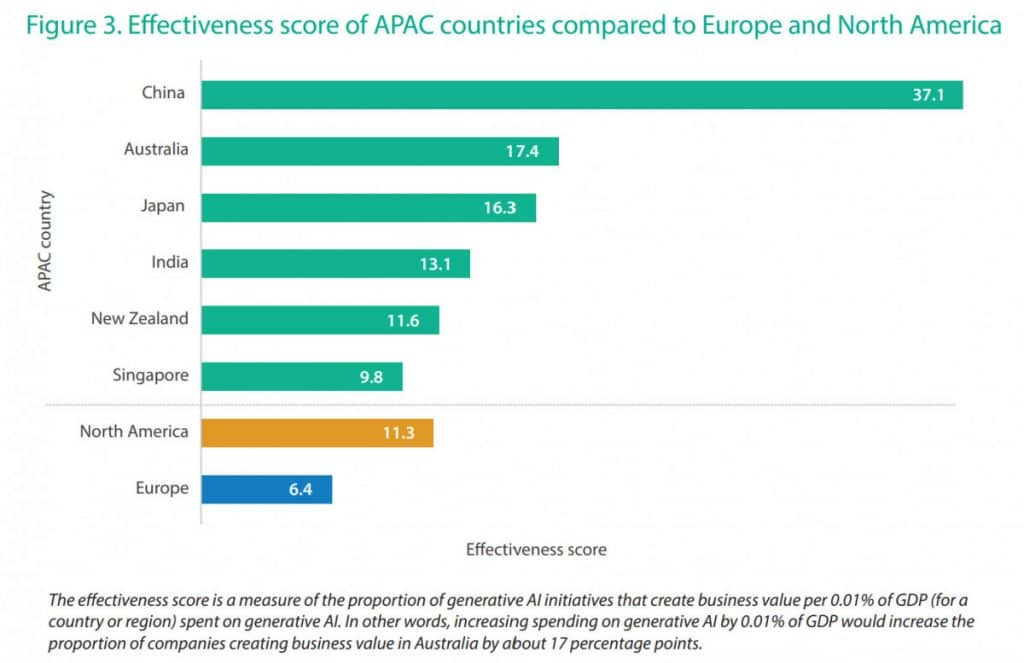APAC Businesses to Spend $3.4B on Generative AI in 2024, claims Infosys Report


In Brief
APAC businesses will increase spending on generative AI from $1.4 billion in 2023 to $3.4 billion in 2024, according to an Infosys report.

Six of the APAC countries including Australia, New Zealand, China, Japan, India and Singapore, are going to increase spending on generative AI initiatives from $1.4 billion in 2023 to $3.4 billion in 2024, according to Infosys’s Generative AI Radar APAC report.
While APAC companies lag behind their North American counterparts in generative AI spending, the research forecasts a more significant increase than in any other region – 140% in 2024.
The report further highlights an interesting trend – the APAC spending on generative AI as a proportion of GDP is half that of Europe and one-third of North American spending. Despite lower expenditure, 55% of APAC companies are already implementing to create business value compared to 46% of North American and 42% of European companies.
According to the report, although APAC companies spend less proportionally than the region’s economy, they still lead the way in generative Al adoption. The region spends its money more effectively and creates more business value from its initiatives — particularly in China.

Within the APAC region, Australia and New Zealand (ANZ) are experiencing the highest growth rates in spending in the APAC region and globally. ANZ investment is expected to grow by more than 150%, from $60 million to $151 million in 2024.
The report asserts that APAC’s generative Al spending might grow twice as fast as North America’s; APAC companies could deliver significantly more generative Al business value by the end of 2024 than North American businesses.
APAC Expresses Concerns Around Generative AI
The report highlights 9% of APAC leaders indicating that generative Al will harm business – despite successes so far. The biggest obstacles to generative AI adoption in APAC include caution around responsible AI including data privacy, data usability, ethics, and bias.
There are concerns about the impact on reputation and employee readiness. ANZ explicitly shows less concern about data usability but needs to catch up on employee readiness for generative AI. Generally, business leaders in ANZ are significantly more worried than their counterparts in other regions about the negative impact on their business models.
Asian leaders also have notable concerns about its practical implications, such as its potential negative impact on talent and cost efficiency. However, it’s crucial to recognize that a fundamental purpose of enterprise AI is to complement and enhance human capabilities rather than supplant them entirely.
Approximately one-third of APAC companies identify data privacy and security as the foremost challenge in generative AI. This sentiment aligns with governmental directives, particularly in New Zealand, emphasizing the importance of open and accessible dialogues surrounding ethical and privacy considerations.
Moreover, data usability emerges as a significant hurdle for about a quarter of APAC respondents, closely followed by concerns related to ethics, bias, fairness, and safety within AI systems.
The fragmented regulatory landscape adds to the complexity of companies operating in this region. Unlike the European Union (EU), where firms benefit from a cohesive regulatory approach exemplified by the EU AI Act and the General Data Protection Regulation (GDPR), individual countries within the APAC zone have distinct legal frameworks governing AI and data privacy. This regulatory diversity challenges companies navigating compliance and ethical standards across various jurisdictions.
Disclaimer
In line with the Trust Project guidelines, please note that the information provided on this page is not intended to be and should not be interpreted as legal, tax, investment, financial, or any other form of advice. It is important to only invest what you can afford to lose and to seek independent financial advice if you have any doubts. For further information, we suggest referring to the terms and conditions as well as the help and support pages provided by the issuer or advertiser. MetaversePost is committed to accurate, unbiased reporting, but market conditions are subject to change without notice.
About The Author
Kumar is an experienced Tech Journalist with a specialization in the dynamic intersections of AI/ML, marketing technology, and emerging fields such as crypto, blockchain, and NFTs. With over 3 years of experience in the industry, Kumar has established a proven track record in crafting compelling narratives, conducting insightful interviews, and delivering comprehensive insights. Kumar's expertise lies in producing high-impact content, including articles, reports, and research publications for prominent industry platforms. With a unique skill set that combines technical knowledge and storytelling, Kumar excels at communicating complex technological concepts to diverse audiences in a clear and engaging manner.
More articles

Kumar is an experienced Tech Journalist with a specialization in the dynamic intersections of AI/ML, marketing technology, and emerging fields such as crypto, blockchain, and NFTs. With over 3 years of experience in the industry, Kumar has established a proven track record in crafting compelling narratives, conducting insightful interviews, and delivering comprehensive insights. Kumar's expertise lies in producing high-impact content, including articles, reports, and research publications for prominent industry platforms. With a unique skill set that combines technical knowledge and storytelling, Kumar excels at communicating complex technological concepts to diverse audiences in a clear and engaging manner.


















































